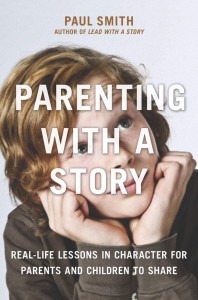Podcast: Play in new window | Download | Embed
Subscribe: RSS
Podcast (parenting-with-a-story-podcast-series): Play in new window | Download | Embed
Subscribe: RSS
 As is true with many people, Shawn Callahan learned much about what he thinks about work from his earliest job. Only unlike most people, Shawn’s first boss was a former United States Marine, and his father.
As is true with many people, Shawn Callahan learned much about what he thinks about work from his earliest job. Only unlike most people, Shawn’s first boss was a former United States Marine, and his father.
Shawn’s dad served in the Vietnam War, after which he was assigned a post at the U.S. Embassy in Australia. By the time Shawn was a teenager, his father was running a business in the capital city of Canberra installing commercial kitchens in local restaurants.
Shawn’s first job
One year while he was on holiday from school, Shawn worked for his dad to earn a little extra money. On one of those days, Shawn’s dad dropped him off at a work site with instructions to clean all the debris from the demolition they had just finished so they could put the new kitchen in. He told Shawn, “I’ll pop back in and check on you at lunch and see how you’re doing.”
By the time Dad came back, Shawn had finished most of his work. It was a hot day, and Shawn was tired. So he was just sitting on the floor in the foyer comfortably shoveling the last remaining bits of plaster into a waste bin. When his father walked up, he snapped at him, “What in the hell are you doing?”
“What do you mean?” Shawn asked. His father replied,
Why are you sitting on your ass?
“Look, Dad, I’m just tidying up a few last pieces here. You should see what I’ve done in the other room . . .”
But dad interrupted, “I don’t care what you’ve done. It’s what you look like you’re doing now that bothers me. You might have worked your tail off all morning. But at the moment it looks like you’re slacking off.”
What Dad knew was that the owner of the restaurant could have walked in at any minute and seen Mr. Callahan’s employee sitting on his backside lazily moving some bits of plaster around instead of working diligently. Not exactly the impression he wanted his customer to have.
At first, Shawn thought his dad was criticizing him for the work he had done. But dad made it clear that was not the case. “I can see you’ve done a good job, son. But it’s just as important to look like you’re doing a good job. You’ll leave a better impression on the people you work with and work for.”
The Lesson
Shawn concluded that it’s better to work hard until the job is completely done, and then leave or take a break, or even do nothing once you’re done. Any of those would be better than working halfheartedly. It would be a shame to work hard and do good work just to have the people around you conclude that you’re a slacker.
It’s a lesson Shawn has drawn on many times throughout his career, which has spanned three decades now. Today, he’s a successful entrepreneur and consultant with his own thriving business (www.anecdote.com). And he hasn’t gotten there by sitting around on his ass.
As with all the stories in these podcasts, I encourage you to share this with your kids, and then have a discussion about it. Here are some questions to get you started.
- Do you agree with Shawn’s conclusion that it’s better to work until the job is done than to work halfheartedly, even if you get the job done in either case? Why or why not?
- What are some other things Shawn could have done instead of sitting down to finish the job
- When you see someone working along the side of a road, leaning against their shovel doing nothing, what do you think about them? And is that a fair thing to conclude?
- How do you know when it’s time to relax and not work so hard?
[You can find this and over 100 other character-building stories in my book, Parenting with a Story.]
—
 Paul Smith is one of the world’s leading experts on business storytelling. He’s a keynote speaker, storytelling coach, and bestselling author of the books Lead with a Story and Parenting with a Story.
Paul Smith is one of the world’s leading experts on business storytelling. He’s a keynote speaker, storytelling coach, and bestselling author of the books Lead with a Story and Parenting with a Story.

 Connect with him via email here.
Connect with him via email here.
Follow him on Facebook, LinkedIn, Twitter.
Sign up for his newsletter here to get one new story a week delivered to your inbox.


That’s right, the job is not done until its completely done and have left the premises; THAT’S when the job is done….
That’s a good add, Steve. Until you’ve left the work site, you’re still making an impression on people.
A good reminder, may we all proceed diligently until the job is done and then take the deserved break!